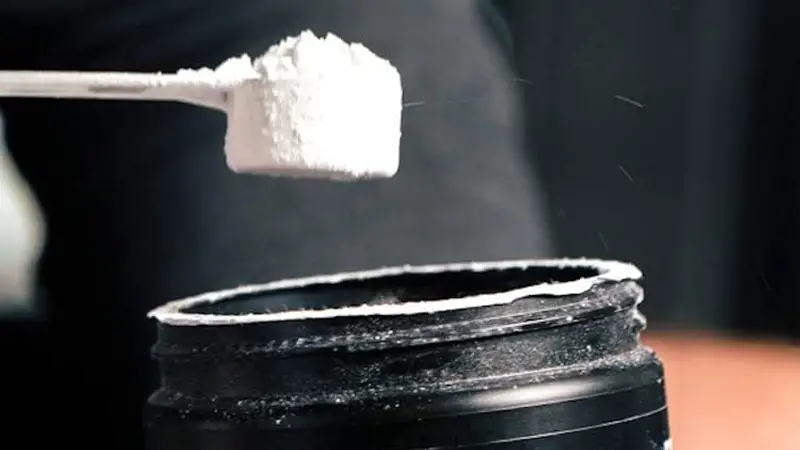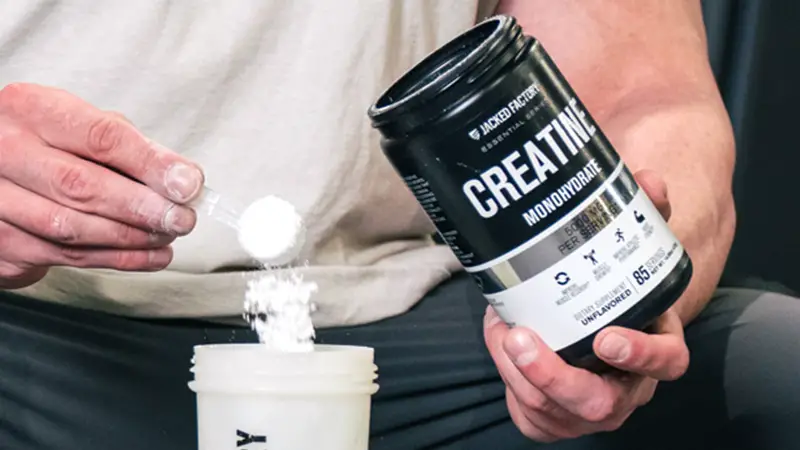For many, the day doesn’t truly begin until that first sip of steaming hot coffee touches their lips. Coffee is a beloved morning ritual, cherished for its rich flavor and caffeine kick.
But what if there was a way to take your daily brew to the next level, enhancing both your alertness and your workout performance? Enter Creatine, a popular and well-researched dietary supplement that has taken the fitness world by storm.
In this article, we’ll explore the intriguing question: Can you put creatine in coffee? We’ll delve into the science behind creatine, its potential benefits for enhancing physical performance, and the compatibility of this supplement with your favorite caffeinated beverage.
By the time you finish reading, you’ll have a clear understanding of whether combining creatine and coffee is a match made in heaven or a recipe for a caffeine catastrophe.
Can You Put Creatine in Coffee? A Comprehensive Guide

Yes, you can put creatine in coffee. Many people choose to mix creatine with their coffee as a convenient way to incorporate it into their daily routine. Here are a few points to consider when mixing creatine with coffee:
Temperature
While hot liquids like coffee may not degrade creatine significantly, extremely hot temperatures might affect its stability. It’s generally safe to mix creatine with warm or moderately hot coffee.
Absorption and Effectiveness
Mixing creatine with coffee does not impact its effectiveness or absorption. The body can still utilize creatine effectively when it’s consumed with coffee.
Taste
Creatine is relatively tasteless, so it shouldn’t alter the flavor of your coffee significantly.
Caffeine Interaction
There’s some debate about the interaction between caffeine (in coffee) and creatine, but current research indicates that consuming caffeine alongside creatine does not diminish the effectiveness of creatine.
Hydration
Both caffeine and creatine affect hydration levels. Caffeine is a diuretic, while creatine increases the need for water. So, it’s important to maintain good hydration if you mix creatine with coffee.
Timing
If you’re using creatine for athletic performance, you might consider the timing of your intake. Whether you take it with coffee or separately, it’s more about consistent daily intake than the specific timing relative to your workouts.
What Are the Considerations and Precautions?

While combining creatine and coffee is generally safe and may offer numerous advantages, it’s essential to be mindful of a few considerations:
Caffeine Sensitivity
While combining creatine and coffee is generally safe and may offer numerous advantages, it’s important to recognize that not everyone responds to caffeine in the same way. Some individuals are more sensitive to caffeine than others.
If you find that you experience side effects such as jitteriness, increased heart rate, anxiety, or digestive discomfort when consuming coffee alongside creatine, it’s advisable to consider reducing your caffeine intake or opting for decaffeinated coffee.
This adjustment can help you enjoy the benefits of both substances without the unwanted side effects.
Hydration is Key
Both creatine and caffeine can have mild diuretic effects, meaning they may increase urine production and potentially lead to a loss of fluids. To counteract this, it’s crucial to stay adequately hydrated throughout the day, especially if you consume multiple cups of coffee.
Dehydration can negate the advantages of creatine and caffeine and may lead to performance issues and discomfort. Ensure that you drink enough water to maintain proper hydration, which is essential for overall health and well-being.
Individual Response Varies
It’s important to remember that people’s responses to supplements can vary widely. What works well for one person may not be as effective or suitable for another.
Given this variability, it’s a prudent approach to start with lower doses of both creatine and caffeine when combining them in your routine. This allows you to monitor your body’s reactions and make adjustments accordingly.
Gradually increasing the doses while assessing your response can help you find the ideal balance for your unique needs and goals.
Consult a Healthcare Professional
Before introducing any new dietary or supplement routine, especially if you have underlying medical conditions or concerns about the combination’s impact on your health, it’s wise to consult a healthcare professional.
They can provide personalized guidance based on your specific health status and needs. They can help you assess the safety and potential benefits of combining creatine and coffee in your individual case, ensuring that it aligns with your overall health and wellness goals.
What Is the Best Way to Take Creatine?

The best way to take creatine is a topic of frequent discussion among fitness enthusiasts, athletes, and researchers. To maximize the benefits, it’s important to consider various factors, including the type of creatine, dosage, timing, and individual needs.
Here are best practices for taking creatine to help you make informed decisions for your fitness journey.
Type of Creatine
Creatine supplements come in various forms, with creatine monohydrate being the most widely researched and recognized. It is often considered the best choice due to its proven effectiveness and safety.
Creatine monohydrate is highly bioavailable and cost-effective, making it a solid option for most individuals. While other forms, such as creatine hydrochloride (HCL) and creatine nitrate, have been introduced, they may lack the extensive research and history that creatine monohydrate boasts.
Dosage
Determining the right dosage of creatine is crucial. A common starting point is 3-5 grams per day, which can be taken all at once or divided into smaller doses throughout the day. However, the ideal dosage can vary based on factors like your body weight, training intensity, and goals.
Some individuals choose to follow a loading phase with higher doses (typically 20 grams per day) for a week, followed by a maintenance dose of 3-5 grams per day. It’s essential to find the dosage that aligns with your specific needs and monitor your body’s response.
Timing
The timing of creatine intake is a matter of debate, but research has provided some insights. Taking creatine at any time during the day can be effective, as long as you consistently consume it.
Some people prefer to take creatine immediately before or after their workouts, as this aligns with the timing of increased blood flow to muscles and nutrient uptake. Others choose to take it in the morning or with a meal.
There’s no significant advantage to one timing over another, so it often comes down to personal preference.
Loading Phase
A loading phase involves taking higher doses of creatine for a brief period to saturate your muscles more rapidly. While it can speed up the time it takes to experience the benefits, it’s not necessary.
If you opt for a loading phase, it typically lasts 5-7 days, during which you consume 20 grams of creatine per day. After this loading phase, you can switch to a maintenance dose.
Maintenance Phase
Following a loading phase, or if you choose not to do one, it’s important to maintain your creatine intake. This typically involves 3-5 grams of creatine per day. Consistency is key to sustaining the benefits of creatine over the long term.
Hydration
Both creatine and caffeine can have mild diuretic effects, which increase urine production and may lead to fluid loss. To counteract this, it’s essential to stay adequately hydrated, especially if you consume coffee or other caffeinated beverages alongside creatine.
Dehydration can negate the advantages of creatine and caffeine and may lead to performance issues and discomfort.
Combining Creatine with Caffeine
Some individuals may choose to combine creatine with caffeine, as both supplements have benefits for exercise performance. Research suggests that caffeine can enhance the effects of creatine when used in combination.
However, if you decide to combine these supplements, it’s crucial to consider your caffeine sensitivity, hydration, and individual response. Start with lower doses and monitor your body’s reaction to find the right balance for your specific needs.
FAQs
Is creatine safe to use as a dietary supplement?
Yes, creatine is generally considered safe for most individuals when used as directed. It has been extensively researched, and its safety profile is well-established. However, it’s important to consult with a healthcare professional before starting any new supplement.
Can I take creatine if I’m not an athlete or bodybuilder?
Absolutely. Creatine can benefit a wide range of individuals, including those who aren’t athletes or bodybuilders. It may help support muscle health, improve cognitive function, and even offer potential health benefits.
What’s the difference between creatine monohydrate and other forms of creatine?
Creatine monohydrate is the most researched and widely used form of creatine. It’s known for its high bioavailability and effectiveness. Other forms of creatine, such as creatine hydrochloride or buffered creatine, are marketed as having better solubility and reduced side effects.
How long should I use creatine, and should I cycle it?
The duration of creatine use and whether to cycle it is a matter of personal preference.
Many individuals choose to take creatine continuously without cycling. However, some opt for cycling, which involves using creatine for a certain period (8-12 weeks) and then discontinuing its use for a short period.
Can I combine creatine with other supplements or medications?
Before combining creatine with other supplements or medications, it’s crucial to consult with a healthcare professional.
Creatine is generally safe, but interactions can occur with certain medications or other supplements, so it’s essential to ensure that your supplement regimen is safe and effective.
Conclusion
The combination of creatine and coffee is not only feasible but can also be a powerful duo for those seeking enhanced physical performance and cognitive benefits.
By adding creatine to your coffee, you can conveniently incorporate this well-researched supplement into your daily routine, potentially boosting your strength, power, and endurance during workouts.
While the taste may not be for everyone, the benefits are certainly worth considering. Just be mindful of the caffeine content if you’re sensitive to it, and consult with a healthcare professional before making significant changes to your diet or supplement regimen.
Ultimately, whether you’re an athlete looking to optimize your training or simply someone who enjoys a good cup of coffee, this intriguing pairing offers a new and exciting way to kickstart your day.
So, give it a try and see if the combination of creatine and coffee can help you reach your fitness goals.
Hi, I’m Mark Pattinson and I’m a freelance personal trainer. I’ve been working in the fitness industry for over 10 years especially since I work with diabetes patients and I love helping people achieve their fitness goals. I believe that everyone can benefit from a good workout, and I’ll do everything to make sure you get the most out of your training.